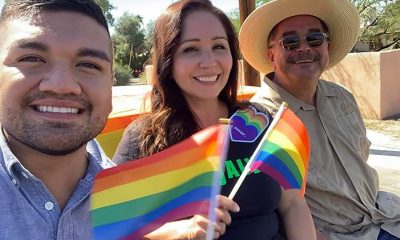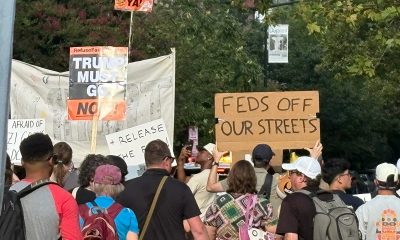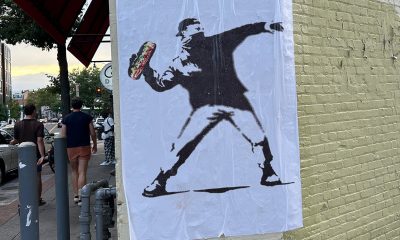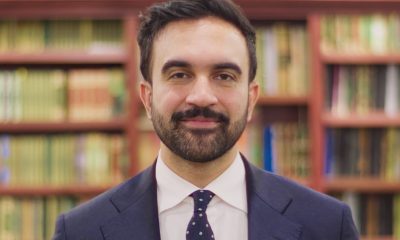News
Gay, bi lawmakers criticized for joining GOP on Obamacare vote
Sinema, Maloney sought to delay individual mandate
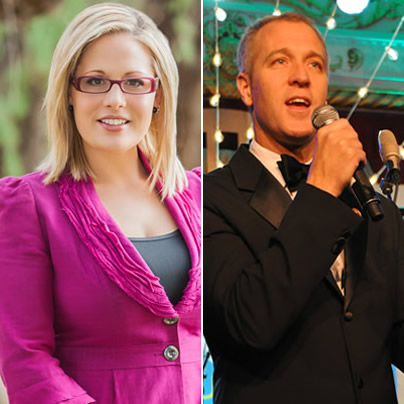
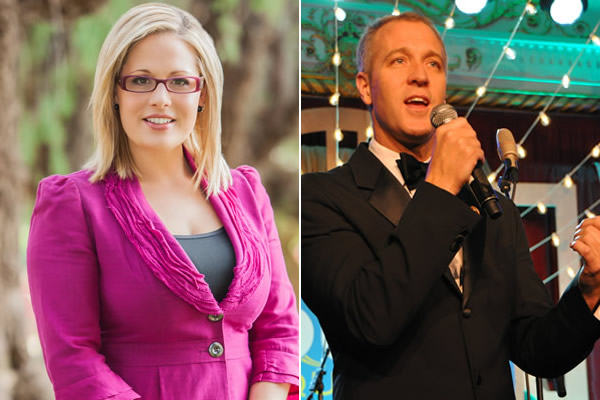
Rep. Kyrsten Sinema (D-Ariz.) and Rep. Sean Patrick Maloney are incurring the wrath of gay activists for voting with House Republicans. (Photo of Sinema courtesy the Sinema campaign; Washington Blade photo of Maloney by Michael Key).
Two Democratic members of Congress — one gay and one bisexual — are incurring the wrath of LGBT activists for voting with House Republicans to delay certain portions of Obamacare in exchange for keeping the government in operation.
Reps. Sean Patrick Maloney (D-N.Y.) and Kyrsten Sinema (D-Ariz.) were among nine Democrats on Monday who voted for a Republican-led resolution that provided funds for the government for fiscal year 2014, but included a provision delaying the individual mandate and requiring members of Congress and their staffs to pay the full cost of insurance without the government subsidy.
Additionally, Maloney voted for another measure that includes the above policy items in addition to calling for a conference committee with the Senate, which would likely mean some give on health care reform.
Both Maloney and Sinema also joined Republicans on Sunday to vote for repeal of the tax on medical devices as part of Obamacare.
Each House proposal was rejected by the Senate, which has insisted on a bill that only continues funding for the government, leading to the stalemate that caused the government shutdown on Tuesday.
Michael Rogers, a D.C.-based LGBT rights advocate, said the vote means Sinema and Maloney are Democrats in name only.
“I am a progressive so I wish Sinema and Maloney were more concerned about the American people than with their reelection,” Rogers said. “When Democrats stand for Democratic principles we win. If these two people won as out LGBT people, surely they would not have been tossed out sticking with their caucus. It is sellouts like Sinema and Maloney who, as DINOs, are more than willing to cave in to the crazy demands of the right.”
Michaelangelo Signorile, a gay New York activist and radio host on SiriusXM, took to Twitter to express his indignation.
Gay ConservaDems took $$ from progressives, Sinema and Maloney, voted #shutdown. Make sure they meet fate of Christine Quinn @DenisDison
— Michelangelo Signorile (@MSignorile) October 1, 2013
John Aravosis, who’s gay and editor of AMERICAblog, also had harsh words for the two lawmakers, who ran as openly gay/bi candidates and took donations from the LGBT community.
“I think it’s abominable,” Aravosis said. “No Democrat, let alone a gay or bisexual one, should be working to undercut health care protections for Americans, let alone helping John Boehner do anything.”
The other openly gay lawmakers in the U.S. House — Reps. Jared Polis (D-Colo.), David Cicciline (D-R.I.), Mark Takano (D-Calif.) and Mark Pocan (D-Wis.) — didn’t join Maloney or Sinema in these votes.
Maloney and Sinema voted against the most drastic proposal from House Republicans to attach a one-year delay of health care reform to the spending bill for fiscal year 2014.
In a statement, Maloney defended his vote for delaying the individual mandate by pointing to the administration.
“I strongly support the president’s decision to give employers more time to comply with the law, and I believe that we should give families the same flexibility we’re giving to our small businesses,” Maloney said.
Maloney also explained his support for eliminating health care subsidies for government employees by saying the playing field for public and private workers should be equal.
“Families and businesses in the Hudson Valley are not getting special subsidies from Obamacare and neither should members of Congress or the White House,” Maloney said.
In a separate statement, Sinema defended her votes by saying they ensure individuals can sign up for health care plans without “being punished” for failing to purchase adequate healthcare coverage.
“It’s now been proven that too many states are not ready to implement the marketplaces,” Sinema said. “It’s not fair to punish people who don’t have the information they need to make informed decisions. Arizona’s hard-working families need transparency and certainty about this healthcare law and its implementation. A one-year delay of the individual mandate will ensure that Arizonans get that certainty.”
Sinema also said health care subsidies for government employees shouldn’t happen with a government shutdown in effect.
“Additionally, I supported tonight’s amendment because members of Congress should not ask the government to pay for their healthcare while Americans at home suffer during government shutdown,” Sinema said.
Neither the office of House Minority Leader Nancy Pelosi (D-Calif.) nor the Democratic National Committee responded to the Blade’s request for comment on Sinema and Maloney joining House Republicans. Shin Inouye, a White House spokesperson, is on furlough and unable to respond to media requests.
The Gay & Lesbian Victory Fund, which endorsed the openly gay/bi candidates and called for donations from LGBT people for the candidates, didn’t respond to a request for comment. The Human Rights Campaign also endorsed both candidates and didn’t immediately respond to a request for comment.
Sinema and Maloney have been active on LGBT-specific issues since their election to Congress. They voted for an LGBT-inclusive version of the Violence Against Women Act reauthorization and signed a friend-of-the-court brief urging the U.S. Supreme Court to strike down the Defense of Marriage Act.
Dana Beyer, a Chevy Chase, Md.,-based transgender activist, said the LGBT community shouldn’t judge Sinema and Maloney too harshly for their votes because “these late night political machinations are generally theater” and don’t say anything about the lawmakers’ overall voting records.
“This issue isn’t about the LGBT community; it’s about America,” Beyer said. “They should be judged on a much broader set of criteria and values than this one vote, and I hope people take the context into account.”
U.S. Supreme Court
Supreme Court rules White House can implement anti-trans passport policy
ACLU, Lambda Legal filed lawsuits against directive.

The U.S. Supreme Court on Thursday said the Trump-Vance administration can implement a policy that bans the State Department from issuing passports with “X” gender markers.
President Donald Trump once he took office signed an executive order that outlined the policy. A memo the Washington Blade obtained directed State Department personnel to “suspend any application where the applicant is seeking to change their sex marker from that defined in the executive order pending further guidance.”
The White House only recognizes two genders: male and female.
The American Civil Liberties Union in February filed a lawsuit against the passport directive on behalf of seven trans and nonbinary people.
A federal judge in Boston in April issued a preliminary junction against it. A three-judge panel on the 1st U.S. Circuit Court of Appeals in September ruled against the Trump-Vance administration’s motion to delay the move.
A federal judge in Maryland also ruled against the passport policy. (Lambda Legal filed the lawsuit on behalf of seven trans people.)
“This is a heartbreaking setback for the freedom of all people to be themselves, and fuel on the fire the Trump administration is stoking against transgender people and their constitutional rights,” said Jon Davidson, senior counsel for the ACLU’s LGBTQ and HIV Project, in a statement. “Forcing transgender people to carry passports that out them against their will increases the risk that they will face harassment and violence and adds to the considerable barriers they already face in securing freedom, safety, and acceptance. We will continue to fight this policy and work for a future where no one is denied self-determination over their identity.”
Justices Ketanji Brown Jackson, Elena Kagan, and Sonia Sotomayor dissented.
The Supreme Court ruling is here.
District of Columbia
‘Sandwich guy’ not guilty in assault case
Sean Charles Dunn faced misdemeanor charge
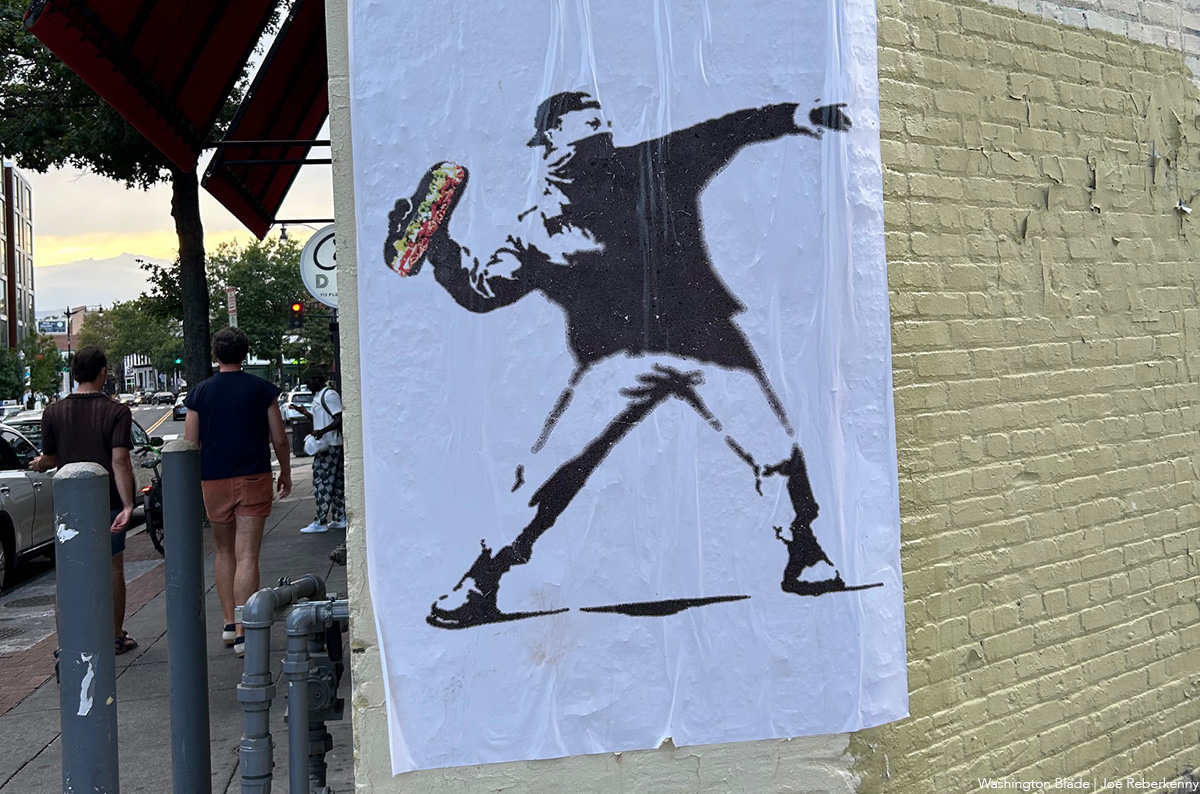
A jury with the U.S. District Court for the District of Columbia on Thursday, Nov. 6, found D.C. resident Sean Charles Dunn not guilty of assault for tossing a hero sandwich into the chest of a U.S. Customs and Border Protection agent at the intersection of 14th and U streets, N.W. at around 11 p.m. on Aug. 10.
Dunn’s attorneys hailed the verdict as a gesture of support for Dunn’s contention that his action, which was captured on video that went viral on social media, was an exercise of his First Amendment right to protest the federal border agent’s participating in President Donald Trump’s deployment of federal troops on D.C. streets.
Friends of Dunn have said that shortly before the sandwich tossing incident took place Dunn had been at the nearby gay nightclub Bunker, which was hosting a Latin dance party called Tropicoqueta. Sabrina Shroff, one of three attorneys representing Dunn at the trial, said during the trial after Dunn left the nightclub he went to the submarine sandwich shop on 14th Street at the corner of U Street, where he saw the border patrol agent and other law enforcement officers standing in front of the shop.
Shroff and others who know Dunn have said he was fearful that the border agent outside the sub shop and immigrant agents might raid the Bunker Latin night event. Bunker’s entrance is on U Street just around the corner from the sub shop where the federal agents were standing.
“I am so happy that justice prevails in spite of everything happening,“ Dunn told reporters outside the courthouse after the verdict while joined by his attorneys. “And that night I believed that I was protecting the rights of immigrants,” he said.
“And let us not forget that the great seal of the United States says, E Pluribus Unum,” he continued. “That means from many, one. Every life matters no matter where you came from, no matter how you got here, no matter how you identify, you have the right to live a life that is free.”
The verdict followed a two-day trial with testimony by just two witnesses, U.S. Customs and Border Protection agent Gregory Lairmore, who identified Dunn as the person who threw the sandwich at his chest, and Metro Transit Police Detective Daina Henry, who told the jury she witnessed Dunn toss the sandwich at Lairmore while shouting obscenities.
Shroff told the jury Dunn was exercising his First Amendment right to protest and that the tossing of the sandwich at Lairmore, who was wearing a bulletproof vest, did not constitute an assault under the federal assault law to which Dunn was charged, among other things, because the federal agent was not injured.
Prosecutors with the Office of the U.S. Attorney for D.C. initially attempted to obtain a grand jury indictment of Dunn on a felony assault charge. But the grand jury refused to hand down an indictment on that charge, court records show. Prosecutors then filed a criminal complaint against Dunn on the misdemeanor charge of assaulting, resisting, or impeding certain officers of the United States.
“Dunn stood within inches of Victim 1,” the criminal complaint states, “pointing his finger in Victim 1’s face, and yelled, Fuck you! You fucking fascists! Why are you here? I don’t want you in my city!”
The complaint continues by stating, “An Instagram video recorded by an observer captured the incident. The video depicts Dunn screaming at V-1 within inches of his face for several seconds before winding his arm back and forcefully throwing a sub-style sandwich at V-1.
Prosecutors repeatedly played the video of the incident for the jurors on video screens in the courtroom.
Dunn, who chose not to testify at his trial, and his attorneys have not disputed the obvious evidence that Dunn threw the sandwich that hit Lairmore in the chest. Lead defense attorney Shroff and co-defense attorneys Julia Gatto and Nicholas Silverman argued that Dunn’s action did not constitute an assault under the legal definition of common law assault in the federal assault statute.
Assistant U.S. Attorney Michael DiLorenzo, the lead prosecutor in the case, strongly disputed that claim, citing various provisions in the law and appeals court rulings that he claimed upheld his and the government’s contention that an “assault” can take place even if a victim is not injured as well as if there was no physical contact between the victim and an alleged assailant, only a threat of physical contact and injury.
The dispute over the intricacies of the assault law and whether Dunn’s action reached the level of an assault under the law dominated the two-day trial, with U.S. District Court Judge Carl J. Nichols, who presided over the trial, weighing in with his own interpretation of the assault statute. Among other things, he said it would be up to the jury to decide whether or not Dunn committed an assault.
Court observers have said in cases like this, a jury could have issued a so-called “nullification” verdict in which they acquit a defendant even though they believe he or she committed the offense in question because they believe the charge is unjust. The other possibility, observers say, is the jury believed the defense was right in claiming a law was not violated.
DiLorenzo and his two co-prosecutors in the case declined to comment in response to requests by reporters following the verdict.
“We really want to thank the jury for having sent back an affirmation that his sentiment is not just tolerated but it is legal, it is welcome,” defense attorney Shroff said in referring to Dunn’s actions. “And we thank them very much for that verdict,” she said.
Dunn thanked his attorneys for providing what he called excellent representation “and for offering all of their services pro bono,” meaning free of charge.
Dunn, an Air Force veteran who later worked as an international affairs specialist at the U.S. Department of Justice, was fired from that job by DOJ officials after his arrest for the sandwich tossing incident.
“I would like to thank family and friends and strangers for all of their support, whether it was emotional, or spiritual, or artistic, or financial,” he told the gathering outside the courthouse. “To the people that opened their hearts and homes to me, I am eternally grateful.”
“As always, we accept a jury’s verdict; that is the system within which we function,” CNN quoted U.S. Attorney for D.C. Jeanine Pirro as saying after the verdict in the Dunn case. “However, law enforcement should never be subjected to assault, no matter how ‘minor,’” Pirro told CNN in a statement.
“Even children know when they are angry, they are not allowed to throw objects at one another,” CNN quoted her as saying.
The White House
Political leaders, activists reflect on Dick Cheney’s passing
Former VP died on Monday at 84
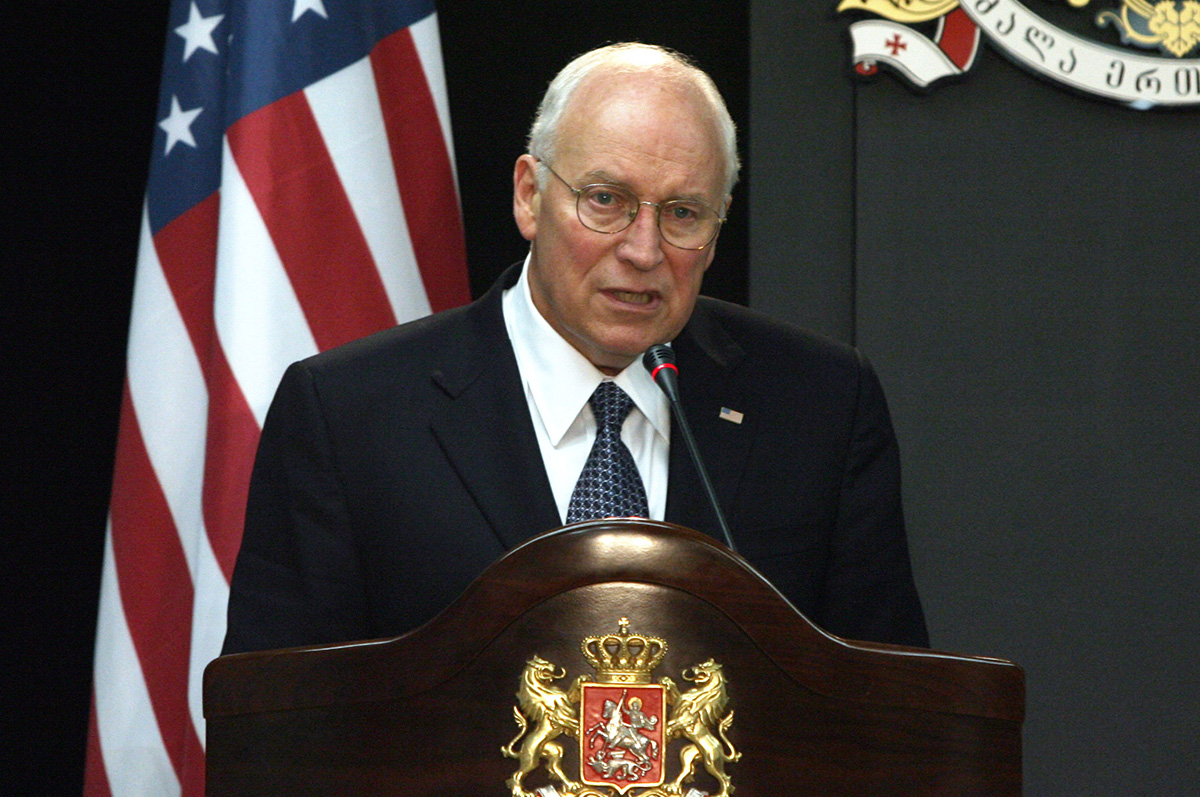
Dick Cheney, the 46th vice president of the United States who served under President George W. Bush, passed away on Monday at the age of 84. His family announced Tuesday morning that the cause was complications from pneumonia and cardiac and vascular disease.
Cheney, one of the most powerful and influential figures in American politics over the past century, held a long and consequential career in public service. He previously served as White House chief of staff for President Gerald Ford, as the U.S. representative for Wyoming’s at-large congressional district from 1979-1989, and briefly as House minority whip in 1989.
He later served as secretary of defense under President George H.W. Bush before becoming vice president during the George W. Bush administration, where he played a leading behind-the-scenes role in the response to the Sept. 11 attacks and in coordinating the Global War on Terrorism. Cheney was also an early proponent of the U.S. invasion of Iraq, falsely alleging that Saddam Hussein’s regime possessed weapons of mass destruction and had ties to al-Qaeda.
Cheney’s personal life was not without controversy.
In 2006, he accidentally shot Harry Whittington, a then-78-year-old Texas attorney, during a quail hunt at Armstrong Ranch in Kenedy County, Texas — an incident that became the subject of national attention.
Following his death, tributes and reflections poured in from across the political spectrum.
“I am saddened to learn of the passing of former Vice President Dick Cheney,” former Vice President Kamala Harris posted on X. “Vice President Cheney was a devoted public servant, from the halls of Congress to many positions of leadership in multiple presidential administrations,” she added. “His passing marks the loss of a figure who, with a strong sense of dedication, gave so much of his life to the country he loved.”
Harris was one of the Democrats that the Republican had supported in recent years following Trump’s ascent to the White House.
Former President Joe Biden, who served as former President Obama’s vice president, said on X that “Dick Cheney devoted his life to public service — from representing Wyoming in Congress, to serving as Secretary of Defense, and later as vice president of the United States.”
“While we didn’t agree on much, he believed, as I do, that family is the beginning, middle, and end. Jill and I send our love to his wife Lynne, their daughters Liz and Mary, and all of their grandchildren,” he added.
Human Rights Campaign Senior Vice President of Federal and State Affairs JoDee Winterhof reflected on Cheney’s complicated legacy within the LGBTQ community.
“That someone like Dick Cheney, whose career was rife with anti-LGBTQ+ animus and stained by cruelty, could have publicly changed his mind on marriage equality because of his love for his daughter is a testament to the power and necessity of our stories.”
-

 District of Columbia23 hours ago
District of Columbia23 hours ago‘Sandwich guy’ not guilty in assault case
-

 Sports1 day ago
Sports1 day agoGay speedskater racing toward a more inclusive future in sports
-

 Celebrity News3 days ago
Celebrity News3 days agoJonathan Bailey is People’s first openly gay ‘Sexiest Man Alive’
-

 Opinions4 days ago
Opinions4 days agoNew York City mayoral race gets nasty but Mamdani will win

